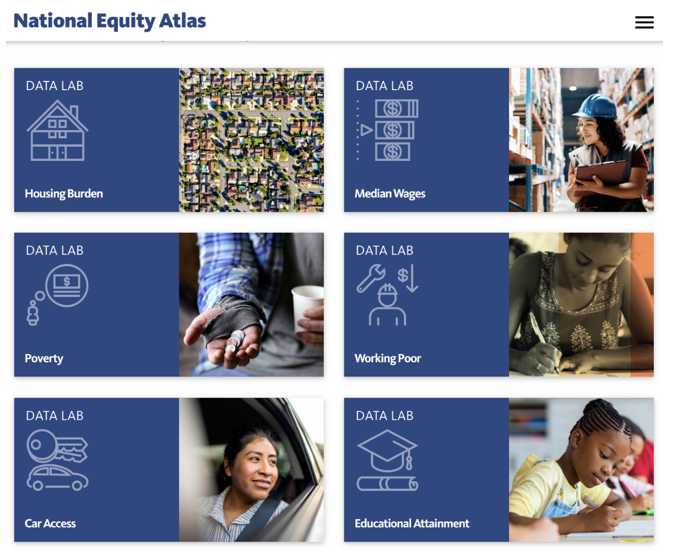Dear Atlas users,
As the Covid-19 pandemic dragged on into its second year, the communities most impacted by its economic fallout and systemic inequities advocated for emergency relief and long-term solutions for a more equitable and resilient economy. The Atlas team is proud to support these efforts through our data tools, research, and partnerships with grassroots organizations. In 2021, we published more than a dozen original analyses, and our user base doubled to more than 100,000 people. Here are a few highlights from the year.
Powering Advocacy for Eviction Protections and Rent Relief
Stabilizing renters experiencing housing insecurity is key to an equitable recovery. In April, we launched a regularly updated rent debt dashboard, in partnership with the Right to the City Alliance, that equips advocates and policymakers with timely, local data on the extent of rent debt in their communities to inform policies to prevent eviction and eliminate rent debt. Since its debut, the dashboard and our accompanying analysis have been accessed 19,000 times, and advocates in California, Indiana, Minnesota, and elsewhere used our data to make the case for equity-focused recovery policies at both local and state level. News outlets, including the Los Angeles Times, ABC Baltimore, Texas News Today, the New York Times, and CNN, produced over 150 articles using dashboard data.
Launching the Racial Equity Data Lab
This summer we launched the Racial Equity Data Lab, a new interactive space on the Atlas that helps you create custom displays to tell your community’s equity story, powered by Tableau software and Atlas data. Our Tableau-ready datasets for equity indicators like Poverty, Car Access, Working Poor, and Educational Attainment can be customized to build factsheets and dashboards at the local level. Learn how to use this new tool with this step-by-step guide and starter viz to create your own factsheet to show who in your community is able to access a $15/hour wage.
Activating Local Efforts to Advance Workforce Equity
Through our ongoing Advancing Workforce Equity project, in partnership with the National Fund for Workforce Solutions and Emsi Burning Glass, we worked with local leaders in nine regions across the country to catalyze cross-cutting strategies to build a more equitable economy. In addition to two national reports detailing the early labor-market impacts of the pandemic and laying out a forward-looking, data-driven framework for workforce equity, we published five tailored analyses and blueprints for local action in Boston (with SkillWorks), Chicago (with the Chicagoland Workforce Funder Alliance), Dallas and Collin Counties (with Pathways to Work), the San Francisco Bay Area (with ReWork the Bay), and Seattle (with the Workforce Development Council of Seattle-King County).
Supporting Gig Worker Rights, Equity in Federal Contracting, and Housing Security for All
Throughout 2021, the Atlas team partnered with leaders working to address structural racism and the inequitable impacts of the pandemic to provide actionable insights and analyses across a range of issue areas.
- Through a study with Rideshare Drivers United, we found that California rideshare drivers, particularly Latinx drivers, are struggling to access health insurance and a safe workplace following the passage of Prop 22. As the first study on rideshare health care access under this legislation, our work was lifted up in SF Examiner, KQED, and The American Prospect, among others.
- We analyzed small business access to federal contracting dollars, revealing that the number of small businesses contracting with the federal government shrank dramatically – by 40 percent – over the past decade. This analysis contributed to the Biden Administration’s new commitments to advance equity in federal procurement, including increasing federal contracting with businesses owned by entrepreneurs of color to 11 percent in 2022.
- We produced a series of fact sheets in partnership with For the Many, who used our data to advocate for Good Cause eviction protections across New York’s Mid-Hudson Valley. Our analysis showed that 54 percent of renter households in the region are rent-burdened, and Black and Latinx households are especially impacted. In October Newburg became the first city in the region to pass a law protecting renters from eviction without good cause, as other municipalities in the region consider similar legislation.
Bolstering Regional Equity Campaigns: News from the Bay Area Equity Atlas
Throughout 2021, 50,000 users turned to the Bay Area Equity Atlas to access equity data and policy tools, double the number of users in 2020. The team produced a landmark report on the diversity of high-level elected officials in the Bay Area, which revealed that while these leaders are becoming more representative of the communities they represent every year, significant inequities remain: people of color represent 60 percent of residents, but just 34 percent of top electeds.
Atlas In the News and On The Road
This year, our data and analyses informed 190 print and digital news articles in outlets including The New York Times, CNN, NPR, The Hill, and Buzzfeed News (see full list here). We also shared our work with a diverse set of audiences, conducting dozens of presentations and trainings to policymakers, government agencies, grantmakers, community leaders, and peer organizations, including the House Committee on Ways and Means, Aspen Institute Opportunity Youth Forum to Clear Impact’s Measurable Equity One Year Challenge, and Partnership on AI’s Partner Perspectives: The Next 5 Years in AI.
Join Our Team!
USC Equity Research Institute is hiring a one-year postdoctoral position to provide data analysis support to the Bay Area and National Equity Atlas team. The fellow will help the team design, organize, and conduct advanced quantitative analyses producing academic articles as well as popular reports. Please send experienced candidates our way!
- The National Equity Atlas team at PolicyLink and the USC Equity Research Institute (ERI)






